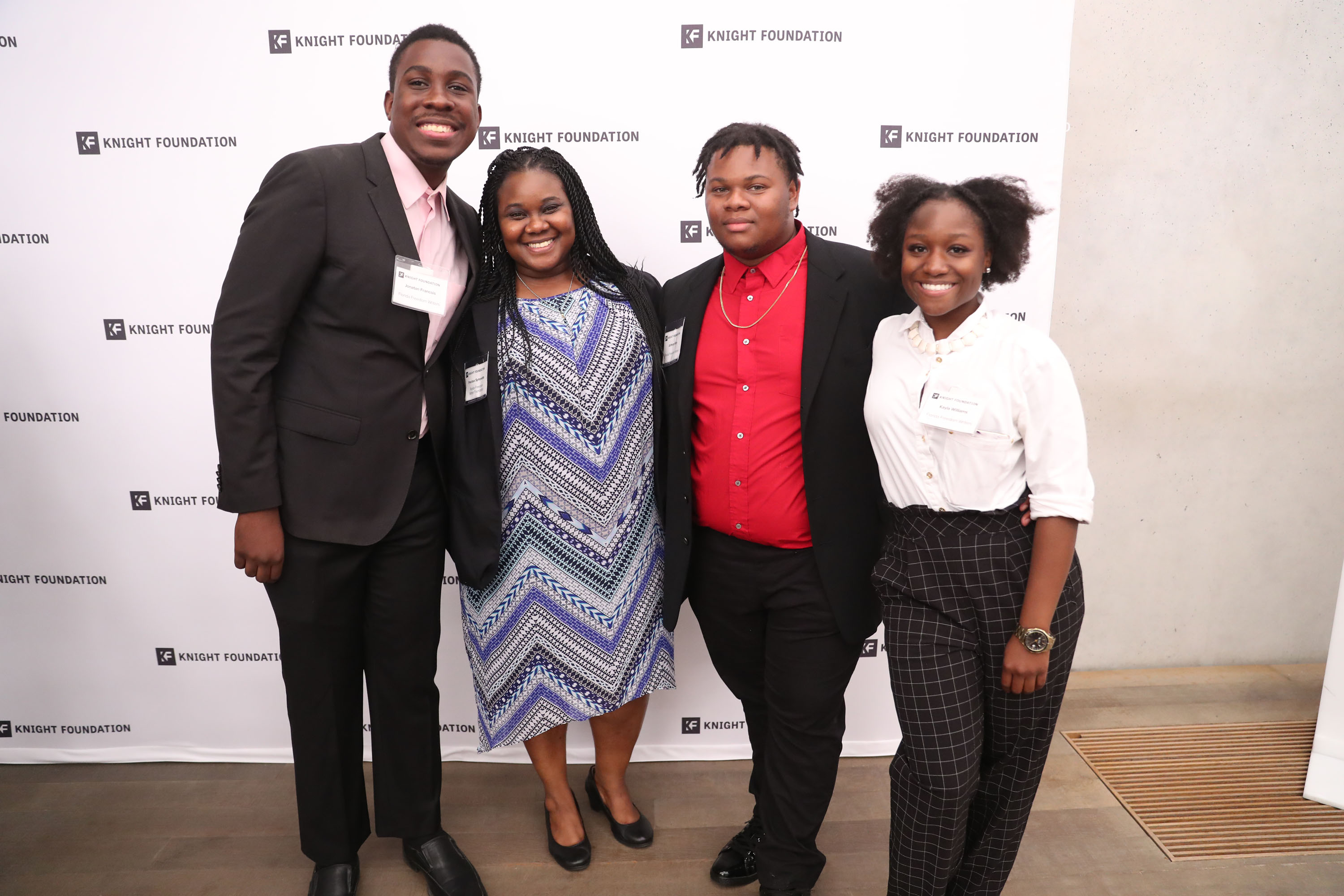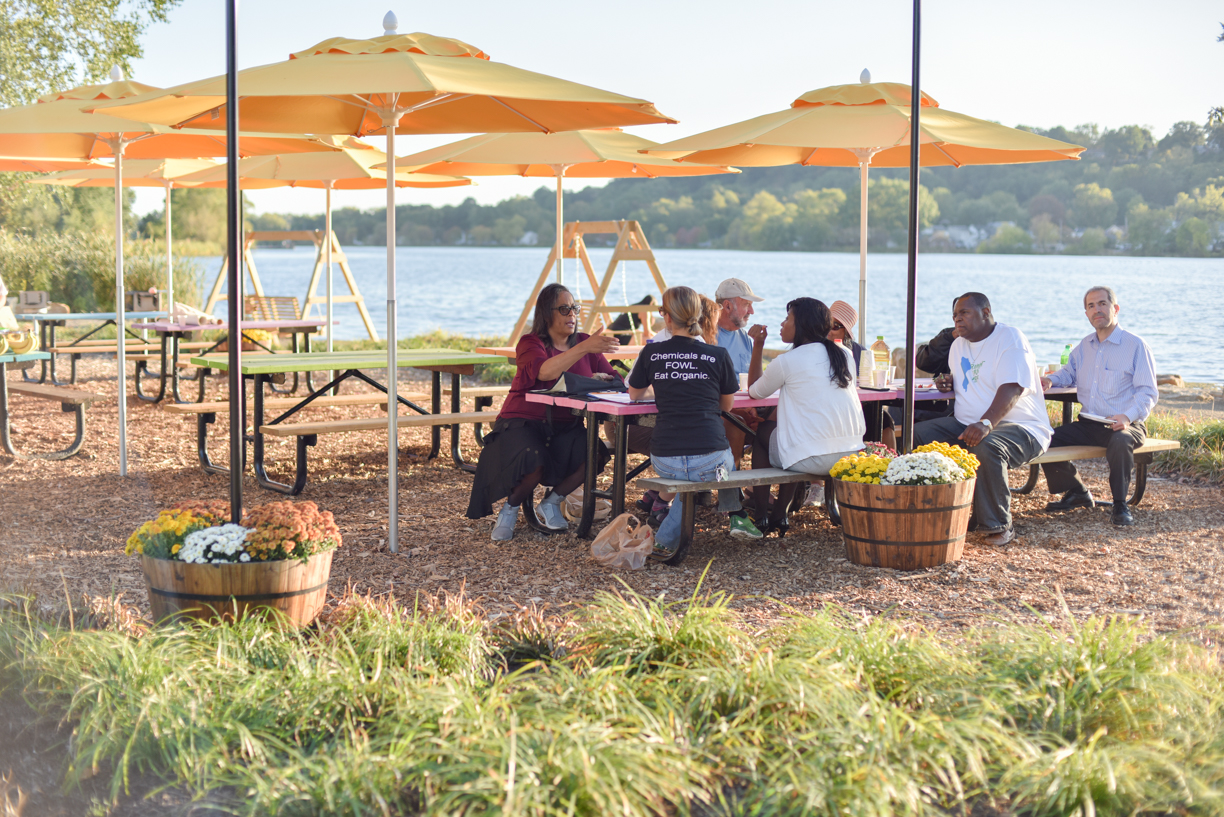To support the launch of Talent Scout Miami, a curated platform that helps Miami’s most promising startups recruit the most talented people.
Program Area: Community Impact
The grant will support conceptual design and planning for three parks in the Akron Parks Challenge and two commercial corridors that are part of the city’s Great Streets initiative, along with additional community design assistance.
The report, “Evolving Arts Ecosystems: A Study of Miami,” assesses how the Miami arts ecosystem has evolved over the last decade.
On Dec. 3, 2018, Knight Foundation announced a $37 million investment in Miami’s growing arts ecosystem. Learn more about the announcement here.
Summary
Knight Foundation believes that the arts play a critical role in connecting people to the places where they live. To concentrate its impact, the foundation has focused its funding in specific communities, including Miami— home to Knight Foundation’s headquarters.
Arts and culture have been a centerpiece of Miami’s transformation for more than a decade. From the Art Basel art fair—a mecca for international curators and collectors—to several new world-class facilities, Miami saw an explosion in artistic, creative and cultural activity since 2005, the period studied in this report.
Knight wanted to better understand how the arts ecosystem in Miami has evolved. The foundation commissioned this study with TDC, a cultural sector research and consulting firm, to determine whether the arts have in fact become more accessible and prevalent in Miami. The review sought to address the following key questions:
- How has Miami’s arts ecosystem (organizations, audiences, funding, creative industries) changed?
- What are the continuing gaps in the system?
- Do the arts in Miami connect people to the community and to each other?
- What has been Knight’s role?
This report provides a snapshot of key indicators reflecting how the arts in Miami have evolved over the past decade. The analysis synthesized several secondary data sources and interviews with key stakeholders in the community.
Key Findings
The report shows that the arts have indeed taken on a larger role in Miami:
The arts have been a driving force in the city’s growing stature: Arts and culture have been a key force in Miami’s ascendance. The arts have been an accelerant of growth, creating a vibrant array of social offerings and professional opportunities in a city that historically lacked them. As summed up by one local leader: “Miami has changed in the last 10 years—feels like a renaissance has taken place. There is so much vibrancy.”
The Miami arts ecosystem has grown more vibrant: The arts have flourished over the past decade with the emergence of new organizations and the maturation of anchor institutions. Total spending among arts organizations increased 168 percent from 2005 to 2015. The investment in the arts has been punctuated by the erection of new buildings by anchor arts institutions, making the changes quite visible. The growing artistic activity and infrastructure have elevated Miami into an internationally recognized cultural center. One leader offered a comment typical among those interviewed: “It’s grown enormously. There are many more organizational players, and anchor organizations have come into their own. Miami feels bigger than it used to be; there is so much more to do here.”
The arts are a critical attractor to Miami: The result has been a more robust arts ecosystem that is attracting people to Miami and keeping them. Arts attendance has steadily risen, and a sentiment has formed that “Arts are part of the attraction of this city as we unfold our second 100 years— it’s a cool place to live.” Furthermore, there is a widely held belief that arts have reversed the exodus of creative talent due to lack of opportunity. As expressed by one key stakeholder: “Many more students are staying than before—no more talking about how ‘I have to go to New York.’ ”
In Miami, Knight has been the foremost private funder of the arts, providing critical capital for both experimentation and the development of core institutions. Local arts leaders view Knight as a strategic, insightful and well-respected partner. One individual noted, “The ecosystem is radically altered from 10 years ago, and I cannot emphasize enough the role Knight has played. They are the foundation.” Said another, “Knight’s work has been transformational—they have succeeded in making art general in Miami.”
But continued progress isn’t assured. The arts in Miami rely on a limited number of funders, and many of the largest arts organizations operate with little to no operating reserves. Several of those interviewed also suggested that rising property values have put artists and arts organizations at risk of displacement. Despite these questions, Miami has seen a clear expansion in the role and scope of its arts and cultural ecosystem.
Download the full report here.
Image (top): A performance of “One Night in Miami” at Miami New Drama. Credit: Stian Roenning.
-
Arts / Press Release
-
-
-
Arts / Article
- Evolving Arts Ecosystems – A Study of MiamiExternal Content / Website
Charlotte boasts a demographically diverse population, well-educated residents and a thriving economy. Home to the largest population in the state, the Queen City also serves as the economic epicenter of the state. Nevertheless, our community is paradoxical in many ways, with social, economic and political barriers that hinder equitable growth, opportunity and prosperity for those who live here.
Despite the array of sports, hospitality, entertainment and industries that drive the local economy, Charlotte is home to high levels of residential and school segregation that perpetuate a system of uneven distribution of public resources, educational attainment and economic opportunities. Charlotte holds the dubious distinction of being 50 out of the 50 largest metropolitan areas in terms of intergenerational economic mobility.
Our community has been in conversation for years about how these challenges affect us all.
A less-discussed topic within this conversation is how these challenges influence civic life. From October 2016 through June of 2017, a team from the UNC Charlotte’s Urban Institute and Johnson C. Smith University used a mixed-methods approach to explore how the local landscape influences civic engagement.
Our research built on user research conducted on a national scale by the Google Civic Innovation Team in 2014. In particular, we sought to further the understanding of a population called “Interested Bystanders,” or people who are paying attention to the issues around them, but not acting on those issues.
The full report goes into further detail of our findings, providing a deep dive into different types of interested bystanders. Some of our key findings are below.
Key findings
- Many people in Charlotte are sitting on the sidelines of civic life. 45% of the Charlotte sample were “Interested Bystanders,” paying attention to local issues but not sharing their opinions or getting locally involved.
- Lack of trust is a major barrier to making civic life more meaningful and inclusive. Although the majority of Interested Bystanders described civic engagement as being actively involved and present in one’s community, there was a large distrust of and lack of attachment to local community and government, which deters engagement. This distrust was especially evident among Latino and Black/African American respondents. Interested Bystanders’ lack of attention to local news also likely contributes to their lack of connection to their community.
- Personal passions can be an on-ramp to civic engagement. Having an interest or passion about an issue or activity was the most common motivator for engagement followed by the political environment. Concern for those closest to them emerged as the base of those motivations.
- Leveraging “civic brokers” could reinvigorate Charlotte civic life. Friends and family are the most influential to Interested Bystanders’ civic participation. Social institutions such as religious organizations, schools, businesses are also viewed as influential. The information and encouragement that Interested Bystanders received online from local institutions and organizations allowed them to take their online actions offline.
What’s Next?
The study concluded over a year ago, but many of our findings are relevant today. Despite high midterm turnout, there is considerable room for further and broader engagement. Three findings of note that our community can leverage now: family and friends are highly influential in engagement; opportunities to engage need to be diverse and considerate of different work schedules, capabilities and personality-types; and people need to understand how their engagement makes a difference.
We also still have a lot of questions. Our study did not have a random sample. As a result, we had more young, female and white participants than what is representative of the Charlotte population. Our research team used focus groups to diversify the sample and elevate a wide range of community voices. However, a more diverse sample is becoming increasingly more important as Charlotte further diversifies and as trust in surveying and government decreases.
In an attempt to correct for these challenges in future research, the UNC Charlotte Urban Institute, in partnership with researchers from the university’s Ph.D. in Public Policy Program and the Department of Political Science and Public Administration, has developed YourVoiceCLT, a Charlotte community survey panel.
A community survey panel is a method to administer surveys that overcomes obstacles that today’s surveys confront. By creating a large pool of participants, YourVoiceCLT can use statistical methods to provide high-quality opinion data to help inform community decisions.
The initiative will let city and county residents share their thoughts about topics related to their quality of life and/or respond to issues in the news. YourVoiceCLT seeks volunteers to build a participant pool that represents the full range of households and opinions in Charlotte. Anyone 18 or older living in Mecklenburg County is encouraged to join. More information about the survey panel and how to sign up are online at YourVoiceCLT.org.
Diane Gavarkavich is the Director of Research Services at the UNC Charlotte Urban Institute. Charles Thomas is Director/Charlotte for the Knight Foundation. This study was supported by Knight Foundation and Google.
-
Community Impact / Report
A TALE OF TWO CHARLOTTES
Widely regarded as a world-class international city, Charlotte boasts a demographically diverse population, well-educated residents, and a thriving economy that has, in part, stimulated and attracted both domestic and international migration, capital, and acclaim. Home to the largest population in the state, the Queen City also serves as the economic epicenter of the state, touting a robust financial services sector that anchors the global banking industry in the southern United States. Nevertheless, the Queen City is paradoxical in many ways, with social, economic and political impediments that confound equitable growth, opportunity, and prosperity for those that reside within its political jurisdiction.
Notwithstanding the confluence of sports, hospitality, entertainment, and banking industries that drives the local economy, Charlotte is home to exceptionally high levels of racialized residential and school segregation patterns and deeply embedded pockets of concentrated poverty that perpetuates a system of uneven distribution of public resources, educational attainment, and economic opportunities. In fact, Charlotte holds the dubious distinction of 50 out of the 50 largest metropolitan areas in terms of intergenerational social mobility.
Subsequently, pervasive intergenerational social immobility found in Charlotte further problematizes initiatives and policies by philanthropic, civic, and governmental leaders to dismantle barriers impeding access to social capital, economic prosperity, and educational opportunities for marginalized communities.In fact, a report authored by Gene Nichols and Heather Hunt claims that “no issue embodies Charlotte’s increasing problems of polarization and marginalization more explicitly, and more dramatically, than its expanding and heavily racialized concentrated poverty. Charlotte is home, in brief, to both North Carolina’s greatest wealth and economic prowess and its most crushing and expansive deprivation.”
Further compounding the city’s paradoxical social milieu, the officer-involved shootings of African American men, most recently Jonathan Ferrell and KeithLamont Scott, set off a political firestorm that sparked protests, demands for greater police accountability, and surfaced deeply entrenched racial tensions between law enforcement and communities of color.
The confluence of these challenges likely influences who engages in civic life, how they engage, and whether and to what degree their interests are represented.
THE STAGE FOR ENGAGEMENT RESEARCH
Using Charlotte as a case study, this research project seeks to explore how the local landscape influences civic engagement. In particular, the population of interest are those termed “Interested Bystanders” or people who are paying attention to the issues around them, but not acting on those issues. This research builds on user research conducted on a national scale by the Google Civic Innovation Team in 2014.
The research presented herein also considers the behaviors and motivations of Interested Bystanders in Charlotte as well as their informational and social influences and the mechanisms that connect online and offline civic behaviors.
To support the growth of Venture for America’s Miami program, which places top-tier university graduates at high-growth companies for a two-year fellowship, through the hiring of a dedicated executive director.
To spark the development of a Collaborative Journalism Fund dedicated to strengthen the San Francisco Bay Area journalism ecosystem.
To program a new space, once vacant, with activities targeting POC communities (youth & adult skating lessons with Black instructors) that reflect St. Paul’s diversity and increase density in the downtown core, especially with Black & Brown peoples.
Lilly Weinberg is director for community foundations at Knight Foundation. Below, she highlights a recent report detailing the impact of the Knight-supported On the Table initiative, which brings together community residents over mealtime conversations to discuss pressing community issues.
In a time of growing polarization, when trust in institutions of all kinds has hit all-time lows and social media conversations often descend into hateful rhetoric, it may seem difficult to find pathways for consensus and common ground. At the same time, the strength of our democracy and our local communities relies on connected action — the ability of residents to hear each other, make informed choices and shape decision-making.
Through this lens, in 2017 Knight Foundation expanded an initiative of the Chicago Community Trust called On the Table. Founded on the basic premise that ‘we all need to eat,’ On the Table brings people from different backgrounds and income levels together to share a meal and discuss pressing community issues. In a few short years, with the help of community foundations across the country, it has united tens of thousands of city residents on a single day to talk about issues from affordable housing and climate change to racial equity and transportation.
At Knight Foundation, we’ve witnessed the impact of On the Table first-hand. We’ve seen how these conversations have informed decisionmakers and led to greater community attachment and connection. In 2017, we convened more than 40,000 people in 10 cities across the country; conversations took place in large and mid-size metropolitan communities and rural areas from the South to the Midwest to the Pacific Coast.
This year, we’ve seen the momentum grow, with participant numbers across 10 cities up to 50,000, and more to tally. Community foundation partners are fueling this energy, offering micro-grants to implement ideas discovered through On the Table in cities such as Philadelphia and Charlotte, N.C., and helping participants raise awareness for issues important to them. In Lexington and Macon the conversations and data informed their five-year strategic plans. Democracy at its best!
What’s most extraordinary however is that amidst growing community narratives of division and dissent — people still want to convene. On the Table reveals, in fact, that city residents are hungry for connection. They want to help make their neighborhoods better and take action in their shared community. And despite the growing role that technology is playing in our lives, there’s a deep desire for in-person, solution-building between people who would otherwise never meet.
This grasp of the ‘power of local’ is important. At the end of the day, your vote for president is secondary if your local school system is broken or your lake polluted. Local communities are where people have the ability to affect change and see its immediate results. And On the Table is giving them a forum to do just that.
In an effort to measure the initiative’s impact, we conducted real time surveys with participants with the help of the University of Illinois at Chicago’s Institute for Policy and Civic Engagement. Here are four important takeaways from the findings:
- Most participants gained new understanding of how to address issues facing their community. The majority of people (58%) said they gained a somewhat-to-much better understanding of how to address issues in their community.

- On the Table spurred new connections with neighbors and encourage civic action. Many respondents reported making new connections with other respondents, including speaking with someone new (62%). Nearly 9 in 10 respondents (86%) said they are somewhat-to-very likely to take action after On the Table, with 40% saying they are very likely.

- Knowledge is power. Learning about new ways to address community issues encouraged civic action, among both those who are very involved in their community (87 percent) and those who aren’t (72 percent).

- Local context matters. Equity and social inclusion, economic issues and poverty, and education and youth development were among the top issues discussed during the On the Table conversations. But topics varied depending on the city. Housing and homelessness, for example, played a large part in discussions in Silicon Valley and Long Beach.
The results are a powerful reminder that despite daily reports of political conflict and ideological collides, people are hopeful—they want to find a way forward. By combining the common need to eat with a platform for positive local change, On the Table provides an outlet for that movement.
To learn more about the On the Table Initiative and the impact of the initiative, click here.
-
Community Impact / Report
Akron is growing. That is a phrase we haven’t been able to say since the 1960’s when population peaked at 292,000. Since then, the city has lost roughly one-third of its population. Yet Akron grew by 135 people in 2015, according to the most recent Census estimate. It’s not a lot – you could line them up, count them, pose for a group picture. But we believe it’s a key sign of what will come, a turning of the tide for a city that has struggled for decades to reverse the forces of decline.
Knight Foundation is one of many organizations working to push Akron forward. To encourage the city’s progress towards stabilization and growth, Knight invests in public spaces, with a focus on building vibrancy in downtown and surrounding neighborhoods. We believe that great public spaces help connect people to place, advance civic participation and provide quality of life incentives that draw in newcomers and encourage residents to stay.
In In 2015, Akron was selected as one of five cities to participate in Reimagining Civic Commons, a national initiative that leverages parks, trails, libraries and other public spaces to connect people across communities. Civic Commons, Downtown Akron Partnership and the City of Akron have engaged the community in a downtown planning process that identified a series of projects to improve neighborhood life. The Akron Civic Theatre’s expansion and adjacent Bowery Redevelopment Project, bolstered by a $4 million investment from Knight, are keystone projects for Main Street revitalization. They also support efforts by the city and private developers to encourage more people to live downtown.
Downtown Akron Partnership also worked with Gehl Studio, an urban research and design consultancy, to complete a Public Space Public Life survey. The study examined how people use sidewalks, parks and other public spaces in downtown, revealing that people are hiding in office buildings rather than exploring the places around them. The next phase of the effort involves a series of projects that invite everyone in downtown to come out and enjoy the city on a daily basis.

Photo courtesy of Gehl Studio
Here’s what they will find: A section of the fence in front of Lock 3 Park has been removed to make way for “Lock Next” – a pop-up patio for people to meet up and hang out. Northside Green, an outdoor living room in the Northside District, now houses a large mural, furniture and restructured parking lots. Once desolate Cascade Plaza hosts numerous activities during the week including picnics, yoga and food trucks.
Akron’s Kenmore, Middlebury and North Hill neighborhoods are doing similar work, designing with residents and the authentic character of the place in mind. With recording studios, guitar shops and nationally renowned Earthquaker Devices, which makes guitar-effect devices like guitar pedals by hand, Kenmore has a burgeoning music scene. To build on the momentum, the Kenmore Neighborhood Alliance hosted “Live Music Now” featuring local bands in a formerly vacant building. The events connected neighbors and helped people imagine a renewed business district.

The Well Community Development Corporation converted a formerly vacant church in Middlebury, the into its headquarters and the ground floor into a coffee shop. Credit: Tim Fitzwater
In addition, think tank City Observatory just named North Hill as one of the most racially and economically-diverse neighborhoods in the nation. To build on that strength, Knight helped support the Exchange House, which hosts AirBnB rooms, providing revenue to help sustain the staff, as well as a community space and adjacent park. Recent events include a ceremony to honor the Police Department’s first Bhutanese Police Officer, a Gum Dip Theatre performance and the North Akron Community Development Corporation’s farmer’s market.

Photo courtesy of The Better Block.
As we study successful cities across the country, a refrain that rings true is that talented people have choices, and the quality of a place is very important them. Akron can be a destination for more people. Knight will continue to invest in initiatives that attract them, by enhancing public spaces, revitalizing neighborhoods and inviting citizens to participate in public life.
Kyle Kutuchief is Akron program director for Knight Foundation.
-
-
Press Release
-
Community Impact / Press Release
-
Community Impact / Press Release
-
Community Impact / Press Release
-
Community Impact / Press Release
-
-
Community Impact / Press Release
-
-
Community Impact / Press Release
-
Akron, Ohio — Nov. 15, 2018 — Akron Civic Theatre today announced plans to transform Akron’s Whitelaw Building into a vibrant new theatre, revitalizing a key corridor of Akron’s primary downtown entertainment and residential district and introducing new opportunities for Akron residents to meet and connect. The project is a collaboration with the Bowery Development Group and is supported by $4 million from the John S. and James L. Knight Foundation and $1 million from GAR Foundation.
The support forms part of the Bowery Redevelopment Project, an initiative that seeks to renovate and repurpose five empty buildings next to the Akron Civic Theatre on South Main Street, as a way to enliven and revitalize downtown. The Bowery Project will break ground tomorrow.
The Akron Civic Theatre has served as a downtown Akron cultural anchor since its opening in 1929; it now draws more than 135,000 people to Akron’s Main Street each year. With new support, one of the six buildings — the Whitelaw building, constructed in 1895 — will be granted new life as a vibrant, 225-capacity performance and flexible-use event space, operated by the Akron Civic Theatre as a complement to its historic 2,592-seat auditorium. The Civic Theatre’s restoration and expansion project, expected to have a total cost of $8.5 million, will also support the revitalization of the theatre’s Grand Lobby and entry arcade that began in 2002, create a multi-level outdoor deck to connect Main Street to public spaces in Locks 3 & 4, and replace the theater’s box office and administrative office.
In late 2016, Akron Mayor Dan Horrigan announced the planned renovation by the Bowery Development Group of the historic Landmark Building and the adjacent five vacant structures connecting to Lock 3, now a downtown park that hosts community and cultural activities. These buildings, each vacant for a decade or more, will be transformed into mixed-use residential, office, retail, bar/restaurant and entertainment space.
“This neglected block of Main Street has served as a physical and psychological stumbling block for too long,” Horrigan said of the redevelopment. “The renovation of these buildings will add desirable residential and retail options that will activate this important section of downtown and complement investments in Locks 3 and 4 and the TIGER grant-funded renovation of Main Street. Most importantly, this project will catalyze additional investments and elevate Downtown Akron as a place where people want to live, businesses want to locate, and visitors want to invest their dining and entertainment dollars. And a stronger downtown means a stronger, more prosperous Akron.”
“The Civic Theatre is a cultural gem that draws people to the heart of our city,” said Kyle Kutuchief, Knight Foundation program director for Akron. “Its restoration will add new life to Main Street, strengthening a downtown beacon that will help energize the neighborhood and connect people to Akron and to each other.”
Locally-based GAR Foundation has also stepped forward with enthusiastic support. “This revitalization project gives overdue attention to our community’s front door on Main Street, in the heart of downtown Akron,” said Christine Mayer, president of GAR Foundation. “The Civic Theatre’s contribution to the local arts and culture sector continues to strengthen Akron’s identity as a vibrant and creative community.”
Additional support has been committed from the State of Ohio, Akron Reimagining the Civic Commons, Mary S. and David C. Corbin Foundation, Lehner Family Foundation, Robert O. and Annamae Orr Family Foundation, Akron Community Foundation, Akron Civic Theatre Women’s Guild, Kenneth L. Calhoun Charitable Trust, GPD Group, and other leadership. A total of $6.5 million has been raised for the project to date.
According to a recent study by Americans for the Arts, (Arts and Economic Prosperity 5 Report) the Civic currently generates an annual $8.1 million in economic activity by presenting 200 events annually. The expanded performance and event space will host 100 events each year and attract 15,000 people pushing the immediate and ongoing impact of the theater’s operations beyond $9 million.
“The Civic is an economic driver in the heart of downtown, and a cultural anchor in our community” said Candice Carlyon, president of the Akron Civic Theatre Board. “We are deeply grateful for the support of the private sector, as well as that of the City of Akron, County of Summit, and, the Development Finance Authority of Summit County, without which this impactful project would not be possible.”
Following a strategic framework created in 2007, The Civic programs a mix of national, regional, and local entertainment, as well as community events ranging from weddings to graduations. A similar mix will be featured in the smaller-capacity new space, while making the existing theater available for more larger scale productions.
“This project is the culmination of more than 10 years of focused and strategic work by the theater’s Board of Trustees and staff,” said Executive Director Howard Parr.“We look forward to talking about this throughout our community and to continuing and expanding the theater’s impact as this exciting plan becomes a reality.”
About the John S. and James L. Knight Foundation
Knight Foundation is a national foundation with strong local roots. We invest in journalism, in the arts, and in the success of cities where brothers John S. and James L. Knight once published newspapers. Our goal is to foster informed and engaged communities, which we believe are essential for a healthy democracy. For more, visit knightfoundation.org.
About GAR Foundation
GAR Foundation was established in 1967 by Galen Roush, co-founder and chief executive officer of Roadway Express, and his wife Ruth Roush. GAR Foundation’s mission is to help Akron become smarter, stronger, and more vibrant. Visit www.garfoundation.org for more information.
About the Akron Civic Theatre
The Akron Civic Theater was built in 1929 by Marcus Loew and designed by famed theater architect, John Eberson. The interior structure was fashioned after a Moorish castle featuring Mediterranean decor, including medieval carvings, authentic European antiques and Italian alabaster sculptures. In June 2001, the Akron Civic Theatre underwent the most comprehensive restoration and expansion project in its history, whereby the theater was brought up to modern performance and patron standards. The theater now attracts 135,000 people annually for nationally touring concerts, comedians, and family shows, as well as a wide variety of events featuring local and regional artists. For more information visit www.akroncivic.com
CONTACTS:
Valerie Renner, Associate Director, Akron Civic Theatre, 330.535.3179, [email protected]
Howard Parr, Executive Director, Akron Civic Theatre, 330.535.3179, [email protected]
Anusha Alikhan, Director of Communications, Knight Foundation, 305-908-2646, [email protected]
Dina Younis, Communications Manager, GAR Foundation, 330-576-2926, [email protected]






